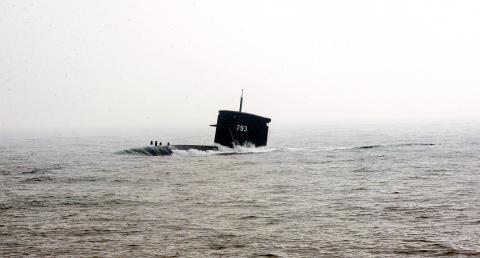Taiwan’s two combat-capable submarines will be equipped with anti-ship missiles next year, providing the nation’s undersea force with a long-distance strike capability it had previously lacked.
The Chinese-language United Daily News reported on Wednesday that more than 30 US-built surface-to-surface Harpoon cruise missiles would become operational on the two Hailung-class submarines sometime next year. The subsonic sea-skimming missiles, which have a range of about 125km, will bring targets along the Chinese coast within range.
The navy recently test-fired the weapons in the US in preparation for their installation on the Dutch-built submarines, the report said, citing unnamed navy sources.

Photo: Chang Chia-ming, Taipei Times
A US$6.4 billion arms sale notification to US Congress in October 2008 included 32 UGM-84L sub-launched Harpoon Block II missiles, plus two UTM-84L exercise missiles and two weapon control systems for Taiwan.
The US Department of Defense awarded a US$43.85 million defense contract to Boeing for the production and procurement of 32 Harpoon missiles for Taiwan in June 2010, with work to be completed in June last year.
The navy has declined to comment on the report, citing a policy of not discussing arms purchases with the media. Taiwan’s frigates and F-16 aircraft are already armed with Harpoon missiles.
However, integrating the Harpoon missiles requires substantial modifications to existing fire control systems and launch tubes and some defense analysts have been skeptical as to whether the Hailungs could accommodate them. Reports last year that indigenously made Hsiung Feng II cruise missiles had been test-launched on the subs were discredited soon afterwards.
However, the latest news is far more credible. The navy first announced its intention to modify the submarines so they could fire Harpoon missiles back in 2005.
Approached for comment, a retired navy officer told the Taipei Times yesterday that the project was entirely feasible.
A standalone fire control system that does not interfere with existing combat systems must be developed, the source said, adding that while it was possible to have the Harpoon fire control system integrated to current systems, doing so would require complicated engineering modification work.
In addition to the fire control systems, adjustments to the torpedo tube mechanism could be necessary to accommodate the launch of both torpedoes and the Harpoon missiles, the source said.
Another option would be to add a standalone launch tube for the Harpoons, he said.
US firm Boeing Co, which was the main contractor for the project, sent experts to Taiwan to assist the navy complete the necessary modifications on the submarines.
Additional work may also have been carried out by Raytheon Corp.

Alain Robert, known as the "French Spider-Man," praised Alex Honnold as exceptionally well-prepared after the US climber completed a free solo ascent of Taipei 101 yesterday. Robert said Honnold's ascent of the 508m-tall skyscraper in just more than one-and-a-half hours without using safety ropes or equipment was a remarkable achievement. "This is my life," he said in an interview conducted in French, adding that he liked the feeling of being "on the edge of danger." The 63-year-old Frenchman climbed Taipei 101 using ropes in December 2004, taking about four hours to reach the top. On a one-to-10 scale of difficulty, Robert said Taipei 101

Nipah virus infection is to be officially listed as a category 5 notifiable infectious disease in Taiwan in March, while clinical treatment guidelines are being formulated, the Centers for Disease Control (CDC) said yesterday. With Nipah infections being reported in other countries and considering its relatively high fatality rate, the centers on Jan. 16 announced that it would be listed as a notifiable infectious disease to bolster the nation’s systematic early warning system and increase public awareness, the CDC said. Bangladesh reported four fatal cases last year in separate districts, with three linked to raw date palm sap consumption, CDC Epidemic Intelligence

US climber Alex Honnold left Taiwan this morning a day after completing a free-solo ascent of Taipei 101, a feat that drew cheers from onlookers and gained widespread international attention. Honnold yesterday scaled the 101-story skyscraper without a rope or safety harness. The climb — the highest urban free-solo ascent ever attempted — took just more than 90 minutes and was streamed live on Netflix. It was covered by major international news outlets including CNN, the New York Times, the Guardian and the Wall Street Journal. As Honnold prepared to leave Taiwan today, he attracted a crowd when he and his wife, Sanni,

Taiwanese and US defense groups are collaborating to introduce deployable, semi-autonomous manufacturing systems for drones and components in a boost to the nation’s supply chain resilience. Taiwan’s G-Tech Optroelectronics Corp subsidiary GTOC and the US’ Aerkomm Inc on Friday announced an agreement with fellow US-based Firestorm Lab to adopt the latter’s xCell, a technology featuring 3D printers fitted in 6.1m container units. The systems enable aerial platforms and parts to be produced in high volumes from dispersed nodes capable of rapid redeployment, to minimize the risk of enemy strikes and to meet field requirements, they said. Firestorm chief technology officer Ian Muceus said